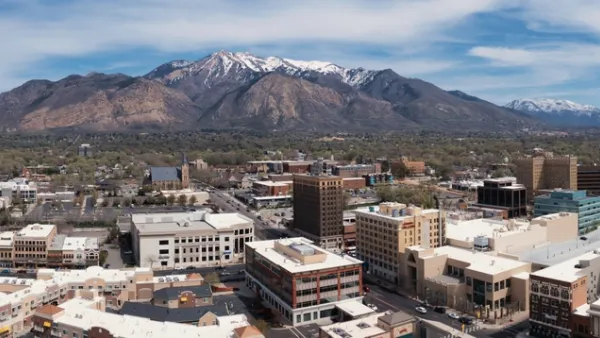More cities and states are recognizing the harmful impacts of minimum parking requirements, which in many cases have accelerated sprawl and raised the cost of housing construction.

California’s recent decision to eliminate parking requirements at developments near public transit could have a major impact on the country’s parking lot ‘addiction,’ writes Ciara Nugent in Time. “The move will encourage developers to build more affordable homes for people who don’t want a parking space, and generate ‘more walkable neighborhoods and public transit,’ [California Governor] Newsom said.”
According to Nugent, “The shift is heartening for climate advocates who believe redesigning cities and how people move around them must be a critical part of the country’s efforts to reduce its outsize greenhouse gas emissions from cars.” The law doesn’t bar developers from building as much parking as demand calls for, but prevents cities from maintaining often exaggerated requirements that drive up building costs.
The article details the history of minimum parking requirements, which began as a reaction to the sudden influx of automobiles to cities as the invention became more affordable. “As more people bought cars, a self-fulfilling cycle set in: cities started to separate districts by use, assuming everyone can drive from their residential area to their shopping area to their office. Large highways began to cut through town centers, making it harder to cycle or walk.”
Today, the tide is slowly turning against parking as cities and states eliminate parking minimums, invest in public transit and other multimodal infrastructure, and encourage developers to build denser, more transit-oriented development that reduces the American overreliance on cars.
FULL STORY: Americans' Addiction to Parking Lots Is Bad for the Climate. California Wants to End It

Analysis: Cybertruck Fatality Rate Far Exceeds That of Ford Pinto
The Tesla Cybertruck was recalled seven times last year.

National Parks Layoffs Will Cause Communities to Lose Billions
Thousands of essential park workers were laid off this week, just before the busy spring break season.

Retro-silient?: America’s First “Eco-burb,” The Woodlands Turns 50
A master-planned community north of Houston offers lessons on green infrastructure and resilient design, but falls short of its founder’s lofty affordability and walkability goals.

Test News Post 1
This is a summary

Analysis: Cybertruck Fatality Rate Far Exceeds That of Ford Pinto
The Tesla Cybertruck was recalled seven times last year.

Test News Headline 46
Test for the image on the front page.
Urban Design for Planners 1: Software Tools
This six-course series explores essential urban design concepts using open source software and equips planners with the tools they need to participate fully in the urban design process.
Planning for Universal Design
Learn the tools for implementing Universal Design in planning regulations.
EMC Planning Group, Inc.
Planetizen
Planetizen
Mpact (formerly Rail~Volution)
Great Falls Development Authority, Inc.
HUDs Office of Policy Development and Research
NYU Wagner Graduate School of Public Service




























